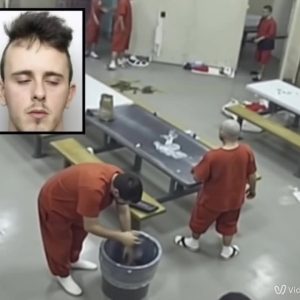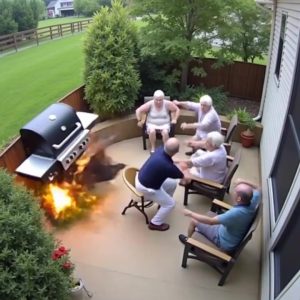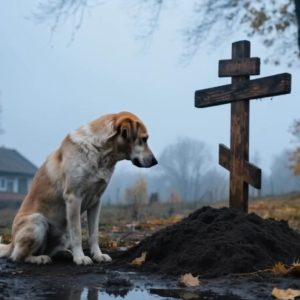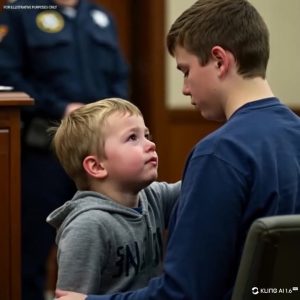Ever since she was a kid, Emily Harper had been enchanted by the magic of photography. Growing up in a modest ranch house just outside Asheville, North Carolina, some of her earliest memories were of her dad turning their tiny bathroom into a darkroom. Under the red glow of a safelight, she’d watch him develop rolls of Kodak film—images of neighbors, mountain vistas, and reflections on the French Broad River slowly emerging on glossy paper. To young Emily, it was pure magic—like watching the world be born again.
Her dad, Tom, would catch her staring and chuckle.
“You’ll be takin’ these shots yourself one day, darlin’,” he’d say, ruffling her hair.
And he was right. By her teenage years, Emily had fallen in love with photography. Even in the age of smartphones and digital cameras, she stuck with vintage film gear, convinced it captured something deeper. Her favorite? A trusty Canon AE-1 from the ‘70s—an American classic. Its clicks and whirs were music to her ears.
One crisp spring morning, Emily packed her camera gear and drove out to Lake Junaluska, a peaceful spot just outside of town. It was one of her favorite places—glimmering in winter, blazing with color in fall, and now in spring, alive with the return of migratory swans. To Emily, swans weren’t just beautiful—they were symbols of loyalty and grace. Perfect subjects.
She rolled up in her old Ford Focus, mentally running through her checklist—extra film, batteries, lens cloth. At just 23, Emily had already made a name for herself in Asheville’s arts scene. Her gallery shows in the River Arts District drew crowds, and local blogs sang her praises. Still, she always gave the credit to her dad.
“He taught me to see the world through a lens,” she often said.
As she turned off the interstate onto a quiet gravel road, that old spark of excitement fluttered in her chest. She’d grown up coming to the lake—family picnics, fishing trips, lazy summer afternoons. Lately, it had become a protected wildlife area—some locals grumbled about the changes, but Emily loved the quiet it brought. The water was clearer, the swans more at ease.
She parked far from the shore to avoid disturbing the birds and stepped out, letting the sunlight warm her face. She grabbed her tripod, her lens bag, and her iced coffee from a local café, then headed down to the water’s edge. The lake sparkled like a painting. Emily raised her camera to her eye.
“This is paradise,” she whispered.
She’d just captured a perfect shot of the swans gliding across the water when a strange sound broke her focus—a rustle in the tall reeds near the shore. Then a splash. And a soft, panicked cry.
Setting her coffee on a rock, Emily crept toward the noise.
“What in the world…?” she murmured.
Pushing aside the reeds, her heart dropped. There, tangled in the thick stalks, was a swan—its feathers smeared with mud and blood, one wing hanging limp. Its eyes locked onto hers, wide with pain and fear.
“Oh my God,” she breathed, hand over her heart. “What happened to you?”
She didn’t think—she just acted. She sprinted back to her car, grabbed an old flannel blanket and a duffel bag she used for camera gear. It would have to do.
“You’re gonna be okay,” she whispered as she returned to the water.
She waded into the lake, cold water soaking her jeans. Carefully, she wrapped the blanket around the swan, holding its wings close to its body. It barely resisted. She carried it back to shore and gently placed it in the duffel, leaving the zipper open so it could breathe.
The bird was heavy—at least fifteen pounds—and her back ached as she hauled it to the car.
“You’re a big guy,” she panted, shoving the duffel into the trunk.
Photography forgotten, she jumped into the driver’s seat and started calling every vet clinic she could find. One after another turned her down.
“We don’t treat wildlife.”
“No room today.”
Just when hope was slipping away, a gravelly voice answered at Mountainview Animal Hospital in Waynesville.
“Bring it in,” the man said. “I’ll take a look.”
Emily blinked back tears.
“Thank you,” she whispered, slamming the car into gear.
She barreled down the highway, glancing at the rearview mirror as if the swan might disappear. When she pulled into the clinic’s gravel lot, a tall man in a worn flannel shirt was already waiting.
“You Emily?” he asked, voice warm and quiet.
“That’s me. Thank you for doing this,” she said, popping the trunk.
Together, they carried the injured swan inside. The vet—Ethan, she learned—examined the bird with practiced hands.
“Looks like a fox got to it,” he said. “Wing’s a mess, but the bone’s intact. Could be worse.”
Emily hovered nearby, holding her breath as he cleaned the wound and stitched it closed.
“Is it gonna make it?” she asked finally.
“It’s got a shot,” Ethan said. “It’ll need rest, antibiotics, and someone to change the bandages.”
Emily’s face must’ve shown her panic—she had a gallery opening coming up, deadlines looming.
“I’ll take care of it here,” Ethan offered. “It’s what I do.”
Relief washed over her.
“You’re a lifesaver.”
He smiled—a small, crooked grin that changed his whole face.
From that moment, things started to shift.
Over the next few weeks, Emily split her time between prepping for her show and visiting the clinic. She named the swan Grace, after the elegant arches of Asheville’s Biltmore Estate. Grace didn’t warm up easily, hissing when anyone got too close. But with time, she began to trust them. Emily brought kale from her garden; Ethan worked his quiet magic with steady hands and calm energy.
Their relationship evolved slowly—first sharing stories, then jokes, then long conversations in the break room over cups of bad coffee. Emily was drawn to Ethan’s quiet strength. He wasn’t flashy or loud, just steady and kind. One night, as they cleaned Grace’s pen, he asked:
“Why film? Digital’s easier.”
“Film’s got soul,” Emily replied. “Every frame’s a choice.”
Ethan just nodded. And from that moment, something clicked between them.
By June, Grace’s wing had healed. On a bright afternoon, they carried her crate to the clinic’s backyard. When they opened it, Grace stepped out, stretched her wings, and let out a loud, triumphant honk.
“She’s ready,” Ethan said, smiling.
Emily’s eyes welled with tears.
“We did it,” she whispered.
Later that summer, they took Grace back to Lake Junaluska. The lake shimmered under the July sun as they released her. Grace hesitated, then stepped into the water and joined a nearby flock.
“She’s free,” Emily said, barely able to speak.
Ethan took her hand.
“And we’re just getting started,” he said softly.
From there, things moved quickly. Their evenings at the clinic turned into hikes, burger runs, and late-night drives. One night, watching fireflies by the French Broad River, Ethan kissed her. It was gentle, then urgent—like something they’d both been waiting for.
By August, Emily was working on a new photo series: Grace’s journey, and maybe, their own. She captured shots of the lake, the clinic, Ethan’s smile when he wasn’t looking. He teased her about it, but she knew he loved it.
And when Ethan asked her to come back to Lake Junaluska one perfect afternoon, Emily knew something was up. The checkered tablecloth, the mason jars, the cider and peaches—it wasn’t just a picnic.
It was the beginning of the next chapter.





